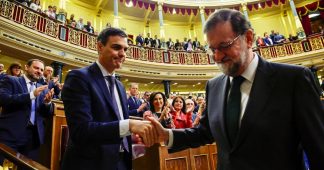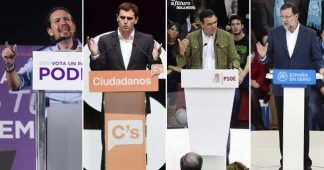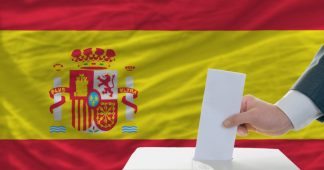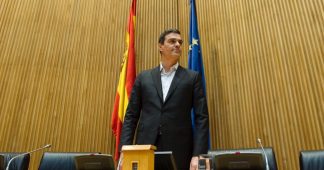The parties of the left must maintain an organic link with popular mobilizations to prevent a continuation of status quo, says Ivan Orosa
by Pavan Kulkarni / The Dawn News / June 24, 2018
The new Prime Minister of Spain, Pedro Sanchez, of the Spanish Socialist Workers’ party (PSOE) assumed office on June 2, a day after ousting the previous Prime Minister Mariano Rajoy of the centre-right Popular Party (PP) which was indicted in a corruption case. Sanchez successfully led a no-confidence motion in parliament with the support of the left-leaning Podemos and the Basque and Catalan separatists. 180 MPs of the 350 MPs in the parliament supported the motion, 169 opposed it and one abstained from voting.
Having assumed office, Sanchez now has the challenging task of governing the country with a parliamentary strength of 84 MPs, with the ousted PP promising to put up a fierce opposition. The support of Podemos, and the nationalist parties of Basque and Catalonia, will be crucial for PSOE to pass legislation.
Among the the key challenges Sanchez will face are addressing the unemployment and financial crises – caused largely due to EU-imposed austerity policies – and negotiating with the Catalan movement for independence.
How well is this newly formed government positioned to tackle these issues? What are the limitations it faces, considering its narrow majority? What role is the ousted PP and the centre-right party, Ciudadanos, likely to play in the opposition? Is the government’s decision to not challenge austerity policies to be seen as a capitulation, or is it a wise move to stabilize the politics of Spain before next election in which it hopes to come back to power with a sufficient majority to challenge the EU? To discuss these issues, The Dawn News interviewed Ivan Orosa, researcher & international political analyst.
Let us first look at Pedro Sanchez’s political struggle with the centre-right sections of his own party. Less than a year after being deposed by an inner party revolt, Sanchez was re-elected as the party’s general secretary last May, after he appealed for the support of the rank-and-file with the promise of forming a “left-wing” opposition to the then ruling PP. His victory has been compared by many to that of Jeremy Corbyn. To what extent does his coming back to power indicate a leftward shift as far as the PSOE is concerned?
Pedro Sánchez is the weak leader of a severely weakened Socialist Party. Between 2008, when Jose Luis Rodríguez Zapatero was re-elected Prime Minister and the last general election in June 2016, the PSOE lost almost 6 million voters, roughly half of its constituency. The party’s institutional power has seen a drastic decline, especially in large cities such as Madrid and Barcelona. It is not going to be an easy task for Sánchez to reposition the party and regain its lost credibility.
The Spanish Socialist Party – PSOE – is a socio-liberal party and a supporter of the EU and the NATO, rather than a radical social-democratic party. It played a prominent role in the post-Francoist, parliamentary monarchical political system that emerged from the Constitution of 1978. Both the PSOE and Mariano Rajoy’s People’s Party were committed to a moderate, at best, reformist political project for Spain, with the goal of inserting the country in the political and economic structures of Western capitalism and liberal democracy.
Under the rule of Felipe González (Spanish Premier, 1982-1996), the PSOE consolidated its reformist, class-conciliatory profile. Spain joined NATO, the European Common Market and embarked on economic reforms that facilitated the liberalization of the economy. Corruption of high-echelon officials and state crimes against members of ETA militant group further stained the record of the PSOE. The working class base of the party was progressively eroded, and the relations with trade unions and other working class organisations deteriorated. However, the PSOE has always managed to retain a certain appeal among the workers and the new middle class.
By 2014, the consequences of the pervasive economic, social and political crisis for the working class, as well as the turmoil provoked by the uprising championed by the 15-M movement (the “indignados”), had severely compromised the stability of the political system in Spain. Popular discontent and the failure of the traditional parties to renew the social contract put the whole regime on the brink of collapse.
By May 2014, the emergence and the massive, instant success of Podemos was attracting the disappointed leftist militant base of the PSOE, and thousands of voters abandoned the party.
In such circumstances, Pedro Sánchez was elected the Secretary General of the PSOE precisely because his lack of experience, and the fact that he was not a prominent member of any internal power group offered him the best chance to undertake a profound renovation of the party.
Pedro Sánchez presented himself as a renewer of the PSOE from the left, organizing a grassroots campaign to get himself elected as Secretary General, appealing to the disenfranchised left-wing bases of the party. It was, really, his only chance: lacking experience and internal power, his left-leaning credentials were the only thing he had.
By the summer of 2016, amid a great political turbulence in the European Union (ongoing crisis in Greece, Brexit vote, escalating conflict with Russia), it was critical to show that the core of the political system in Spain was strong. Being the 4th biggest economy in terms of GDP of the EU, and hosting three US military bases, Spain couldn’t fall prey to the impetus of “populism” and “left radical forces”.
After a failed election of 2015, the polls in 2016 saw the People’s Party winning narrowly. The powers that be (the Spanish bourgeoisie, the big industrial and financial .
capital, the European Commission, the German government, etc.) expected Pedro Sánchez to play the role of the well-behaved social-democratic leader. Instead, he refused to support the proclamation of PP’s Mariano Rajoy with a sound “no means no” stance. The powers in the shadows understood that he was not to be trusted for the job of securing the stability of the Spanish political regime.
That decision cost him the post. He was overthrown as PSOE’s Secretary General by the establishment of his own party in a controversial move. No one expected him to come back. But he did, appealing, as he did before, to the leftist side of the party, to the working-class militants. And he won.
However, it became clear during the process that the internal struggle of Pedro Sánchez against the PSOE establishment is not ideological in essence, not even programmatic. It is quite typical for the PSOE to show a more social, left-leaning face during election time, propose some measures which will appease its left radical constituency (remember the passing of the gay marriage law in 2011), only to fully align with the more neoliberal agenda and policies to please Brussels and the big capital after the elections.
In this sense, Pedro Sánchez has so far contributed to refresh an old, political project fully aligned with an interclass, conciliatory and moderately reformist party. The internal struggle he fought against the PSOE establishment is one for the control of a party that still retains the chance to project hegemony on the Spanish society by drawing support from a wide range of social groups and citizens, from the left to the center-right.
This doesn’t necessarily mean that Pedro Sánchez is a champion of the left. This certainly does mean that he was willing to challenge the government of the People’s Party, as opposed to the PSOE internal establishment, which preferred to form a sort of national salvation front against radical forces. He spearheaded a motion of confidence against Mariano Rajoy because accessing State power was the only way to reposition himself inside the PSOE, as well as to amass the necessary political capital for the PSOE to contend successfully in the upcoming general election of 2020.
Sanchez has not only refused to oppose the EU-imposed austerity policies, but has also appointed the European Commission’s director-general for budgets, Nadia Calvino, as the minister for economy. He has committed to sticking with the budget left behind by Rajoy’s government and to reducing the fiscal deficit to 2.3% of GDP. He has also refused to roll back the labour market reforms, which have been very unpopular among the unions.
Do you perceive this as a capitulation? Or is the government following a policy of implementing symbolic progressive moves – such as promising to repeal restrictions on the freedom of assembly, proposing a law mandating equal pay for equal work for men and women, and forming a cabinet with a majority of female ministers – with the intention of seeking a larger mandate in the coming elections before challenging the EU?
Sanchez’s palatable, engineered cabinet seems fit to send, at the same time, an image of renewal and reversal of some of the most aggressive and anti-popular measures of the former conservative government, while sending a message to the powers that be that he has learned a lesson. Indeed, the more social-oriented profiles of the Deputy Prime Minister, the new ministers of Public Health, Environment, etc. are to be seen alongside with the appointment of highly technical and pro-establishment ministers (the new Economic Affairs Minister, Nadia Calviño is a high-echelon EU official while Josep Borrell, the new Foreign Minister, is a former President of the European Parliament).
So far, we only have signals and not actions. Intentions, and not policies. The new Prime Minister projects a calculated ambiguity because he mainly aims at reconstituting his and the PSOE’s political capital on three levels:
- a) Increasing his own political leverage inside the PSOE, eliminating or severely undermining his political opponents
- b) Improving the electoral chances of the PSOE in the municipal election of 2019 and the general election of 2020. This involves, on the one hand, challenging Podemos and the Spanish Communist Party (PCE) for the left camp [space] and, on the other hand, fighting for the support of the center-left and center sections of the electorate against the rising liberal, Spanish nationalist party, Ciudadanos;
- c) Reinstating the PSOE as the most viable party for the renewal of the parliamentary- monarchical Spanish regime at a moment when the massive failure of the Popular Party, consumed by countless cases of institutionalised corruption, has increased the fragility of the regime.
What we will see during the rest of the term of the legislature (barely two years) is permanent tension building up. This will be the result of, on the one hand, the increasing discontent among social groups – severely hit by the crisis and the People’s Party’s austerity measures – who are demanding an immediate alleviation of their situation and, on the other hand, the attempts of the Sánchez government to show results, but not those that are too radical or transformative. It is true that the constraints are strong, but the political will is lacking too. Pedro Sánchez did not became the head of the government to put forward a progressive, left-leaning agenda for Spain. He became the Prime Minister to reaffirm his power and to reposition the PSOE, especially in the eyes of the most powerful rather than the most vulnerable.
Podemos has clarified that it will not support the government on economic policies or legislations that further the austerity policies. It has, nonetheless, offered to be the government’s main partner, provided the 20 measures they have proposed can be agreed upon. These measures include a raise in interprofessional minimum wage (SMI) to 1000 euros, reversal in the cuts in health, education and other social services and a guaranteed income law.
The government has subsequently lifted the veto imposed by the previous government on 16 proposals of Podemos – including the closure of nuclear power plants, the amendment of the Law of the Workers’ Statute , free legal aid – allowing them to be discussed in the parliament. This seems to indicate that an alliance is being forged between the two parties, which together can command 151 parliamentary seats in the lower house. How do you see the development of the alliance? In general, what role do you see Podemos playing in ensuring PSOE’s leftward orientation?
A solid alliance between the two forces is unlikely. The most probable scenario is that a subtle competition is established between both parties, with episodic outbursts of tension. All in all, both the PSOE and Podemos are competing for the left and center-left voters. So there can’t be a compromise there. Pedro Sánchez made the strategic choice not to form a Government with Unidos Podemos (that was the preferred choice of Podemos’ leader, Pablo Iglesias). So we are seeing a marriage of convenience in which each one of the partners has its own agenda, and to the extent that their interests are aligned, we will not see an open confrontation.
Of course, it is in the best interest of Podemos to keep the debate around the most radical proposals in the political agenda. Podemos will look to sell any significant progress in these realms as the result of their pressure on the Sánchez government. On the other hand, it will be constantly attacked for not allowing the implementation of reformist agenda, which is what Sánchez will try to undertake, in order to appeal to the popular classes and not alienate the powerful and Brussels. The PSOE counts on the support of the bourgeoisie media and an army of commentators. Podemos has a severe disadvantage there.
In my opinion, Podemos needs to do two things: first, it needs to be consistent in its radical approach to the changes needed to revert the anti-popular agenda of the previous PP government as soon as possible. The 20-point plan discussed last week is a good approach, but the major battle will revolve around the elaboration of next year’s budget. PSOE assumed the previous government’s approved budget because it was the only chance to secure the votes for the motion of confidence. If Sánchez is serious about putting an end to austerity, he has to reflect that political will in the new budget. Podemos has to negotiate with all its strength there.
Secondly, Podemos needs to reconnect with the popular movements, with the pulse of the streets. The necessary alliance to be reinvigorated is with the organized popular classes: the popular movements and the citizen platforms which have been putting up a fight in the last decade against austerity and the neoliberal agenda of the People’s Party.
Recent mobilisations – the historic feminist protest that occurred on March 8th, the protests of the elderly for decent pensions and also the struggle for better wages and dignified labour conditions by the room maintenance employees or the Coca Cola employees in Madrid, as well as the work of the PAH/Anti-Evictions Platform and the Dignity Marches for better public services (education, public health) – show that a latent protest is building up. Podemos needs to be their voice in Parliament and display its identification with these movements in the political interplay with the new government. That is the only way for the party to seal the left flank and ensure that the PSOE does not capitalize on working class votes based on its mere access to power.
Podemos has a massive advantage: it is present in all important city governments (the cities for change: Madrid, Barcelona, Cádiz, Santiago de Compostela) since the municipal elections of 2015. The good work done by the municipalities has proved that cities can be ruled efficiently while dramatically improving the life of the people, especially those most vulnerable. Ada Colau in Barcelona and Manuela Carmena in Madrid, both close allies of Podemos, herald that massive change in Spanish politics.
There is a risk that that Podemos and its closest allies – Izquierda Unida (United Left, of which the Communist Party of Spain is a member) – will fail to undertake serious, systematic work alongside the popular movements, and that the illusion of PSOE being left-learning will draw energy from the incipient popular mobilizations, resulting in the latter losing momentum. Already, the two main trade unions, Comisiones Obreras (CC.OO.) and Unión General de Trabajadores (UGT) have cancelled calls for action as a sign of “good faith” to the new government. The preparations for a general strike, initially thought to be called in October, have been suspended.
Podemos can play a crucial role here by preventing the deactivation of social protests and instead, building stronger platforms. The main aim of Podemos, as Pablo Iglesias himself declared just two years ago, is to rebuild a social contract around the demand of the drafting of a new constitution. This is to be through a massive, participatory political process and will seek to bring a permanent solution to the multiple crises that traverse the Spanish State. It will also prevent the attempt of the reactionary forces from re-establishing, or rather restoring, the anti-popular and failed parliamentary monarchy system, the so-called Regime of 1978. This is not a reformist agenda. This is a revolutionary agenda. And sadly, the PSOE is not going to be part of it, unless the size and scope of the necessary popular mobilization forces Sánchez to take part.
The movement for self-determination in Catalonia is another major issue. Having taken the support of the Catalan nationalist parties while leading the no-confidence motion, Sanchez then sought to address the fears of opponents of the movement by appointing as foreign minister, Josep Borrell – a former president of the European Parliament who had campaigned against the demand for Catalonian independence. Having reiterated that separatism is not compliant with Spain’s constitution, Sanchez has been trying to rein in the movements in Catalonia by striking a conciliatory note. How do you see this approach working?
This is an ongoing conflict which, for votaries of Catalan independence, goes back at least 300 years. After Franco’s death, only in the last 5 years has an agenda for the independence of Catalonia significantly taken shape. Nowadays, the territorial crisis remains an open front and is the main source of political instability in Spain.
In October last year, with the call for the referendum on independence, the conflict exploded. The images of the savage repression of the Spanish police against voters, elderly and children at the electoral sites made headlines around the world. Initially, Pedro Sánchez had an ambiguous position but the European Union authorities made it clear that they would not tolerate an independence process in Catalonia. Also, significantly, the King of Spain, Philip VI, gave his famous speech on October 3, 2017 on the issue. This was a clear indication to Sánchez to stick together with Mariano Rajoy and led to the immediate alignment of Sánchez with Rajoy’s government. A few days later, the autonomy of Catalonia was suspended with the explicit approval of the PSOE.
After the suspension and the violent crackdown on protesters, the reaction of the population in the rest of Spain was to support the hard-line approach of Mariano Rajoy’s government. But ironically, it was not the People’s Party that was able to capitalize on the high level of confrontation, but the new rightist, Spanish nationalist party, Ciudadanos. In December last year, Ciudadanos won the maximum number of seats in the regional legislature but could not form the government due to its sheer inability to make arrangements with other formations.
Ciudadanos’ exceptional results (ranking number one in popular vote according to all surveys weeks before the motion of confidence against Rajoy) has reaffirmed its aspiration to rebuild the right and become the next governing party.
Unfortunately for Ciudadanos and for the reactionary forces in Spain, the question is not that simple. The independentists’ determination and an intelligent strategy based on the “internationalisation of the conflict” has kept their aspiration alive. Unlike October last year, it is now possible for the PSOE to lead the attempt of a third, half-way approach between unilateral independence and a baton-enforced status-quo: a negotiated arrangement, increasing the level of autonomy of Catalonia within a larger federalist project for all Spain.
This basically means that the PSOE will push for a negotiated and very limited reform of the Constitution, will grant a higher degree of financial autonomy to Catalonia and will try to solve the complicated case of the political prisoners case (several members of the former Catalan government are still in prison, accused of sedition and treason, although they haven’t been declared guilty yet). This will lead to a clash between the PSOE and the most reactionary Spanish nationalist forces (Ciudadanos, People’s Party). Also, the PSOE can’t fully count on Podemos’ collaboration here: Pablo Iglesias wants to call for a referendum where the Catalan people decide what the relation of Catalonia to Spain will be.
This is an extremely hard-to-handle issue for Pedro Sánchez. Ciudadanos will try to antagonize further the new Government against the sociological right in the rest of Spain, trying to reap more votes. Catalonia used to be a stronghold for the PSOE and now, in the course of just 10 years, the Socialists have lost more than half of their support, mostly Spanish-speaking, urban working class -industry workers, service workers- who are split between Podemos and, most interestingly, Ciudadanos. Pedro Sánchez has made sure that a highly visible Catalan Minister (Meritxel Batet) is in charge of the negotiations with the independentists – a signal showing his disposition to dialogue and to restore burnt bridges. But again, we can’t really expect substantial changes, at least until the general election in 2020.
What role do you foresee the other centre-right party, Ciudadanos, playing, after the PP has been been removed from power? Do you see the former collaborating with the PP or is the party more likely to compete with it by cutting into its vote share and establishing itself as the main centre-right alternative to the ruling party?
Ciudadanos – and its leader, Albert Rivera – had begun to build up a high profile, consolidating its leading position in the polls and gathering support from a wide spectrum of voters, as well as from big capital, disenfranchised conservatives from the People’s Party and an growing section of the bourgeois media. Also, voters from a wide range of ideological backgrounds were impressed by Rivera’s undeterred Spanish nationalism, with a liberal touch. Some compare him with Emmanuel Macron. It’s a fair comparison, although the ideological foundations of Ciudadanos are far more conservative and reactionary than those of the French President. Regarding economic policy, Rivera adheres to a hardcore neoliberal agenda.
But Rivera is impulsive and inexperienced. His poor management of his party’s position during the motion of confidence raised eyebrows. Ciudadanos was the only party to vote against the motion (thus aligning with the PP), and Rivera’s impatience does not help his profile as a statesman, which is essential to navigate the complexities of contemporary Spanish politics.
Historically, the Spanish parliamentary system has rarely seen the co-existence of conservative forces. The People’s Party managed to be a political umbrella for a wide spectrum on forces on the ideological right – from neo-fascists to ultraliberals. All the Spanish right found a home there until the emergence of Ciudadanos – a former regional, Catalan party formed by Rivera to demand the “right of Catalan citizens to educate their children in Spanish. Ciudadanos seeks the collapse of the People’s Party so that it can become the hegemonic right-wing party in Spain.
So no one should expect Ciudadanos to cooperate further with the People’s Party, unless the new PP leadership – which will be elected in an extraordinary congress in July – makes an explicit attempt to break away from its record of systemic corruption, or undertakes the ‘refoundation’ of the party, which is pretty unlikely.
In the current conjuncture, how do you think the Communist Party of Spain can contribute to driving the government’s policies leftward?
Recently, The Communist Party of Spain -PCE- embarked on a process of internal redefinition. It chose a new Secretary General and embraced Marxism-Leninism again, with a renewed focus on internationalism. A nation-wide process of affiliation has started, with the aim of renewing its aged cadre and militant base.
PCE is part of the political and electoral platform Izquierda Unida, which itself is part of Unidos Podemos, the parliamentary platform lead by Podemos. This results in a certain lack of visibility for the PCE in the larger national political scene. Thus, the PCE lacks the leverage to steer the political agenda to the left in itself. It can influence the position of Izquierda Unida inside Unidos Podemos, and the PCE has always played a prominent role in that sense, with its radical stance against austerity, the neoliberal EU and NATO, as well as the support for the demand for a Spanish Republic.
On the other hand, the PCE is very well connected with the organised and more militant elements of the working class. In this sense, the PCE is in a good position to reinforce the mechanism of coordination between those left forces with institutional power and the popular movements which are keeping the struggle alive.











